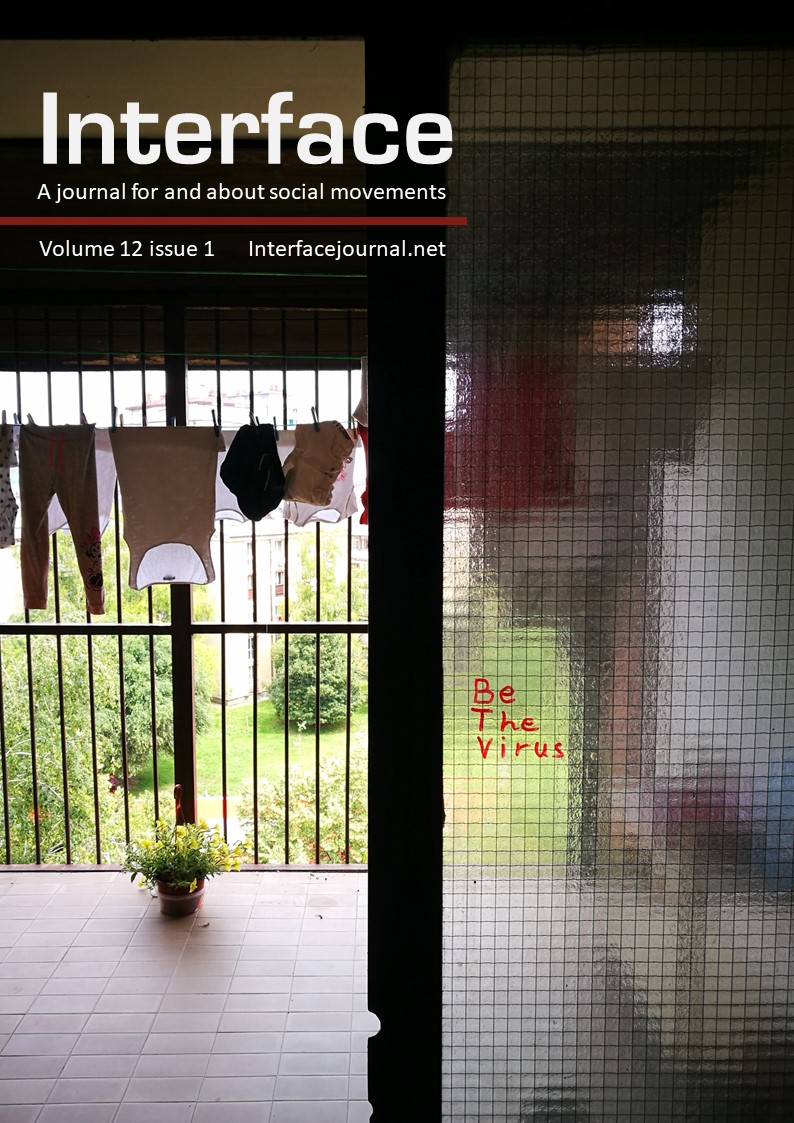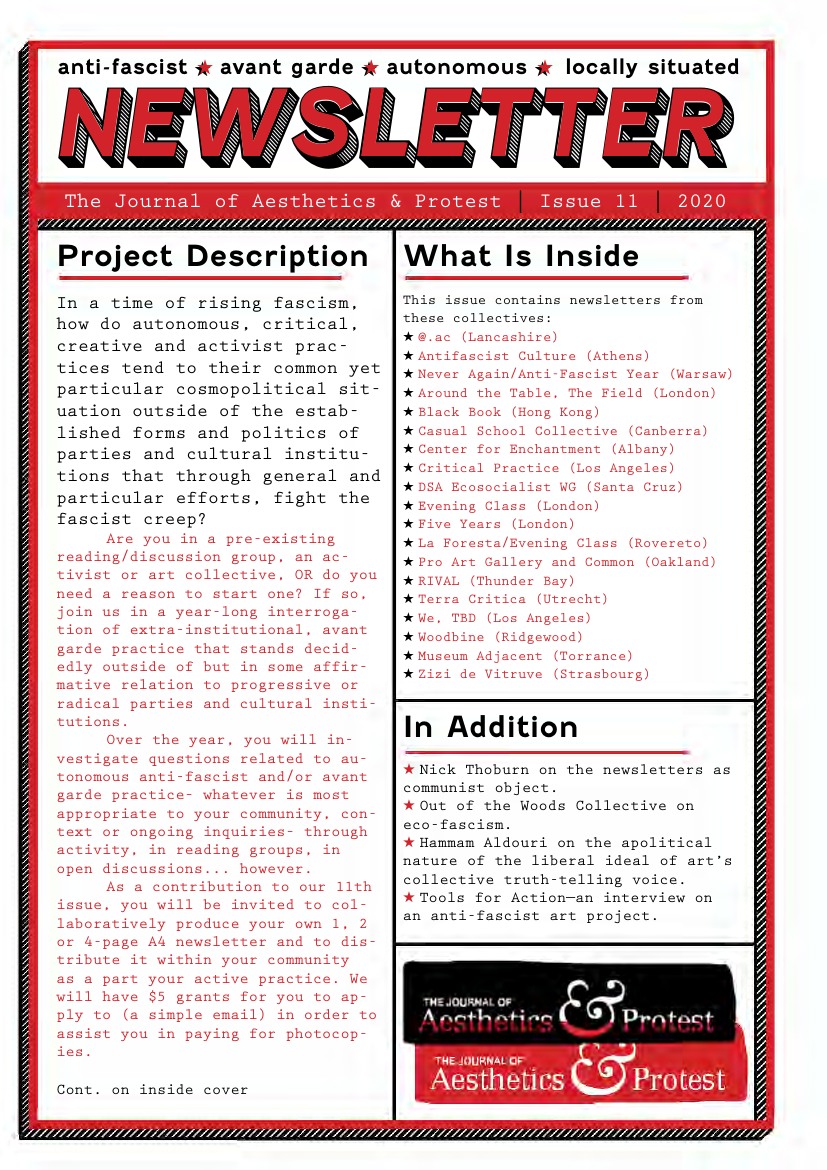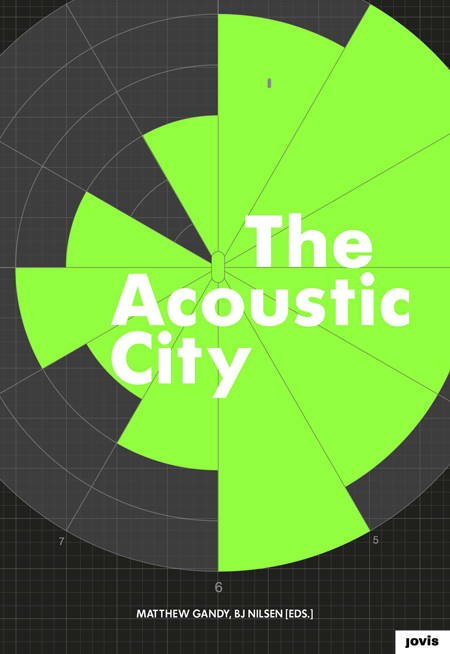Interface, 12(1): Organizing amidst COVID-19: Sharing Stories of Struggle (2020)
Filed under journal | Tags: · activism, art, contagion, ecology, feminism, food, internationalism, labour, lgbtq, migration, pandemic, quarantine, refugees, resistance, social movements, solidarity, virus

“The world is on fire, with both fever and flame. After a few months of lockdown, things are erupting in new ways. The movement for Black Lives is demanding an end to anti-Black racism and conversations about abolishing the police are on late night television. In North America, a new world appears to be dawning, one that didn’t seem possible even a month ago. Meanwhile, in the new centre of global capitalism, the long-standing Hong Kong movement seems to be on the point of succumbing to a new wave of repression.
Around the world, movements are strategizing about how to ensure that no one is left behind. In April we put out a call for short pieces on this theme. We could see that the imminent arrival of the virus had generated many different struggles – initially pressure to force some states to take action in the first place, resistance to cuts and demanding benefits. Then came struggles characterized by mutual aid, efforts to protect essential workers, and the most vulnerable, such as the homeless, prisoners, the elderly and the undocumented.
This issue contains pieces originally written for our rolling coverage of movements in the virus, as well as a few pieces written especially for this special issue. They represent reflective activists and engaged researchers trying to grasp what their movements were doing, and what they should do, in an unprecedented situation.
The contributions reflect on movements in Argentina, Australia, Austria, Belize, Bosnia and Herzegovina, Brazil, Canada, China, Denmark, Egypt, France, Germany, Greece, Haiti, India, Iran, Ireland, Italy, Japan, Kenya, Mexico, Morocco, Pakistan, Russia, Serbia, Singapore, Spain, Switzerland, Syria, Turkey, the UK, the US and globally and are written in English, French, Portuguese and Spanish.” (from Editorial)
Edited by Sutapa Chattopadhyay, Lesley Wood, and Laurence Cox
Publisher Interface, July 2020
ISSN 2009-2431
683 pages
Journal of Aesthetics & Protest, 11: Newsletter (2020)
Filed under magazine | Tags: · activism, anti-fascism, art, autonomy, avant-garde, ecology, internationalism, politics

“Corona, Fascism, Climate Break-Down. Headlines all, and very real crises felt everywhere– things whose concerns work over situations at every scale of possible experience. We are interested in many things in regard to them, including how their nasty effects demand that we put our home affairs in order. Capacities for solidarity, meaningful mutual aid and actual justice emerge from the most intimate of places – that is, from between people and between people and other meaningful things.
This issue’s aim was to facilitate such work in intimate places; to do so, this issue serves primarily as a compilation of autonomously produced and locally distributed newsletters aimed at situating non-fascist thought and/or avant-garde cultural activity. We begin working on it in late 2018 and are completing it in June 2020.” (from Editorial)
Contributors: Hammam Aldouri, Out of the Woods, Nick Thoburn, Tools for Action, @.ac (Lancashire), Antifascist Culture (Athens), Never Again/Anti-Fascist Year (Warsaw), Around the Table, The Field (London), Black Book (Hong Kong), Casual School Collective (Canberra), Center for Enchantment (Albany), Critical Practice (Los Angeles), DSA Ecosocialist WG (Santa Cruz), Evening Class (London), Five Years (London), La Foresta/Evening Class (Rovereto), Pro Art Gallery and Common (Oakland), RIVAL (Thunder Bay), Terra Critica (Utrecht), We, TBD (Los Angeles), Woodbine (Ridgewood), Museum Adjacent (Torrance), Zizi de Vitruve (Strasbourg).
Editors: Marc Herbst, Robby Herbst, Amber Hickey, Claudia Firth
Publisher JOAAP, Leipzig / Los Angeles / London / Berlin / Waterville, ME, Jul 2020
99 pages
Matthew Gandy, BJ Nilsen (eds.): The Acoustic City (2014)
Filed under book | Tags: · acoustics, city, ecology, listening, music, noise, sound, urban design, urbanism

“The Acoustic City consists of a series of essays on sound and the city. The book comprises five thematic sections: urban soundscapes with an emphasis on the distinctiveness of the urban acoustic realm; acoustic flânerie and the recording of sonic environments; sound cultures arising from specific associations between music, place, and sound; acoustic ecologies including relationships between architecture, sound, and urban design; and the politics of noise extending to different instances of anxiety or conflict over sound. This essay collection will be of interest to a wide range of disciplines including architecture, cultural studies, geography, musicology, and urban sociology.”
Publisher Jovis, Berlin, 2014
ISBN 3868592717, 9783868592719
217 pages
via Meowth

